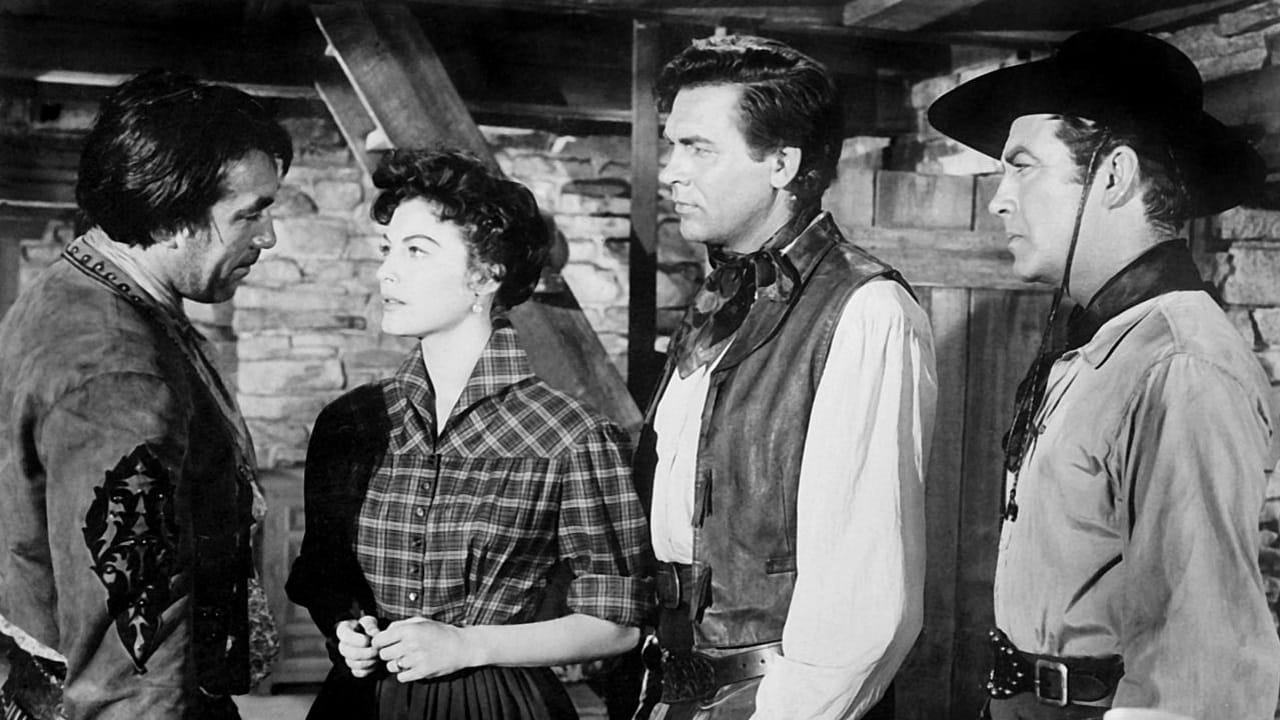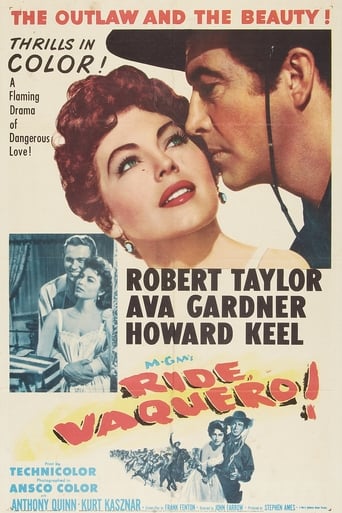

Ride, Vaquero! is directed by John Farrow and written by Frank Fenton. It stars Robert Taylor, Ava Gardner, Howard Keel, Anthony Quinn, Kurt Kasznar and Ted de Corsa. Music is by Bronislau Kaper and cinematography by Robert Surtees. Out of MGM and filmed in Ansco Color at Kanab in Utah (though story is set in Texas), Ride, Vaquero! is collectively unusual, bold and frustrating. Plot revolves around outlaws lead by bandido Esqueda (Quinn) refusing to let settlers and civilisation come to the Brownsville territory. So far so formulaic, then, but Esqueda's right hand man is Rio (Taylor), who was raised by Esqueda's mother and therefore they be adopted brothers. When King Cameron (Keel) and his wife Cordelia (Gardner) refuse to be shunted out of Brownsville, with King trying to rally the townsfolk against Esqueda, Rio starts to feel sympathy for the Cameron's. What unfolds is a sort of Freudian Greek Tragedy, a love quadrilateral as Esqueda and Rio love each other in that manly brotherly way, Cordelia begins to love Rio, love which he is keen to reciprocate, while King will always love Cordelia no mater what. Action is competently put together by Farrow as it all builds to a big finale, which doesn't disappoint on narrative terms, and the airy location photography (this is one of the better Ansco Color productions I have seen) is delightful. While naturally there will be sacrifices and psychologically tinged twists along the way to keep the faithful interested. Quinn is wonderfully ebullient, enjoying himself with a licence to chow down on the script with relish. Taylor is subdued, sleep walking through the film under direction to be a man of quiet menace and emotional confliction. Keel looks like he is desperate to sing a song, or just be some place else, while Gardner is required to just look pretty and pretty wistful from time to time. Kasznar as Father Antonio comes out in credit, but when the screenplay has him refusing stolen money to help the church - only to then have him 15 minutes later shooting away with rifle to kill his fellow man - the inconsistency in the production is further compounded. Keel hated the boredom of the shoot, stuck out in the wilderness with nothing to do for months he said, and Gardner hated Farrow, citing him as a sleazy bully to women and horses! These complaints do show, the film feels like it's treading water, where if you take out Quinn you are left with what comes across as a bunch of actors working for food. Characterisations are not well drawn enough to make the promise of the mind matters work, and supporting players like Jack Elam wander in and out of the picture without due care and attention. There's good intentions in the screenplay, where for 1953 this could have been ahead of its time and setting the bar for Freudian flavoured Westerns. While it's on it engages for sure, but once finished there's the distinct feeling that it was never all that it could have been. A shame really. 6/10
... View MoreIf shoot 'em up westerns are to your taste, this is probably not your cup of tea.The theme of Civilization vs. Barbarism is nicely explored in this very unusual western. The dialog is light years beyond the dialog in most westerns. Specifically, Rio's dialog is some of the best ever written for any character in any film of this genre. Whoever wrote it must have been bi-lingual. From his syntax, it is clear Rio speaks English as his second language. It is as if he is speaking Anglicized Spanish proverbs half of the time. Very Spanish.The gay subtext is unmistakable in the scenes between Rio and Esqueda, yet it is fairly subtle. Rio's beautiful horse and its livery, and his attire all summon up images of early cinematic western heroes. Rio looks like the Cisco Kid's dark alter- ego!It is difficult to accept Cameron's faith that Rio is honorable enough not to kill him once he turns his back. This issue really has two aspects: One is the credibility of Cameron's trust; the second is Rio's actual trustworthiness. Today we find it difficult to believe BOTH that Cameron would be so trusting of Rio and that Rio actually would turn out to be trustworthy. Our credulity is again stretched by Cameron's entrusting Rio with his ranch and wife.But Cameron is a newcomer to the territory, and he values Rio's savvy - about horses, ranch hands and probably survival! Cameron tells Rio that he wants him to help acquire horses for the ranch. Later Cameron's wife asks Rio about the sudden abundance of ranch hands which Cameron wasn't able to hire on his own. These things validate Cameron's motive, implausible as it may seem. I just accept that Cameron is pretty desperate and that he is a good judge of character.Regarding Rio: There was a time when a man felt like he owed his life to someone who had saved (or spared) it. Perhaps most men still lived by that code of honor at the time the movie is set. Or perhaps this was preserved longer in Hispanic culture - Rio's culture. Or perhaps Rio is simply a throw-back in his adherence to such a code. Anyway, the issue did not ruin the movie for me.Delia seems particularly naive (or stupid) for getting Rio to take her to plead Cameron's case with Esqueda. Despite these weaknesses, I enjoyed the film. It never really made me feel excitement, but it generated palpable tension among several characters. However, its uniqueness and dialog were what kept me interested throughout. I found Rio to be one of the most fascinating characters in this entire genre. One of my favorite scenes is when Esqueda is kicked back in his chair in the saloon with his filthy, bare feet thrust toward the camera. Nope, not your typical western!
... View MoreThis is an interesting film because it is not listed in the 2007 Leonard Maltin Guide. Omissions are common in the book (particularly foreign and early films), but films by major American stars are practically never omitted--and this film starred Ava Gardner, Robert Taylor and Anthony Quinn as well as Howard Keel. Maybe it was not listed because the film was so bland. It's not a very good film but not bad either--sort of like dry toast and oh, so forgettable.Quinn and Taylor are thugs who lead a group of bandits who terrorize ranchers. They are very good at it and the only one who seems willing to oppose them is brave Howard Keel and his wife, Ava Gardner. However, Keel seems a bit crazy, as he doesn't seem to have a prayer. Then, oddly, he captures Taylor and instead of killing him makes him promise to be his partner and special friend(?). Now considering how evil Quinn is supposed to be, he leaves Keel and Taylor alone and spends most of the rest of the film pouting and moping! Although the film provided a different interpretation of why Quinn behaved that way, it really seemed like there was a gay subtext to the film. In other words, when Taylor left Quinn, Quinn felt jilted. Actually, pursuing this aspect of the film would have made the movie much more interesting and memorable--too bad they didn't.As for the acting, the one who probably came off best was Keel. Gardner just seemed like another lady, Quinn was fine until he became pouty and wimpy and Robert Taylor seemed half asleep during most of the film--putting zero energy into his role. I really wonder if he was either sick or hated the film so much that he just didn't try. And, despite an occasionally interesting script, I really think the latter might be why Taylor's performance was so listless.
... View MoreAlthough it is supposed to take place in Texas, the film was actually made in Kanab, Utah, which accounts for the fact that it doesn't look a whole lot like west Texas to me.Cordelia and King Cameron (Gardner & Keel) locate to Texas after the Civil War and buy land in order to build a cattle ranch. Mexican bandit Esqueda (Quinn) along with his adopted white brother Rio (Taylor) burns down their house to send a message to other whites from moving into what he considers an intrusion of his territory.This oater is also notable for being one of the few non-singing roles Howard Keel did for MGM. He almost reminds me of a more cultured Joe Don Baker even right down to his western drawl. Gardner is being her usual dignified self and doesn't really add much here to the whole thing other than butting into the men's business.In fact, this film almost starts off as another repeat for Ava Gardner since she was in a similar love triangle with Clark Gable in LONE STAR (1952), except in this one, Taylor refuses her advances and pushes her away, not following the typical Hollywood convention of the time. Good twist on the part of director John Farrow. It adds a darker psychological dimension to the Taylor character.I also enjoyed Anthony Quinn's performance as the drunken Mexican bandit Esqueda, who cowers and sulks in his bedroom when things don't go his way. He comes across as a bitter, drunken buffoon who's obsession reaches a climax when Taylor defects to over to Keel's side, helping him build up their ranch.Quinn then takes over the town of Brownsville in order to force Taylor out into the open. It ends when Quinn & Taylor shoot and kill each other in the saloon while the wounded Keel lies nearby, no match for Quinn's earlier fast draw.Given Quinn's slightly hammy performance along with the darker psychological aspect Farrow's script gives to the Rio/Taylor character, I'm gonna give this one a 6 out of 10. It's not a keeper but it does hold my interest.
... View More